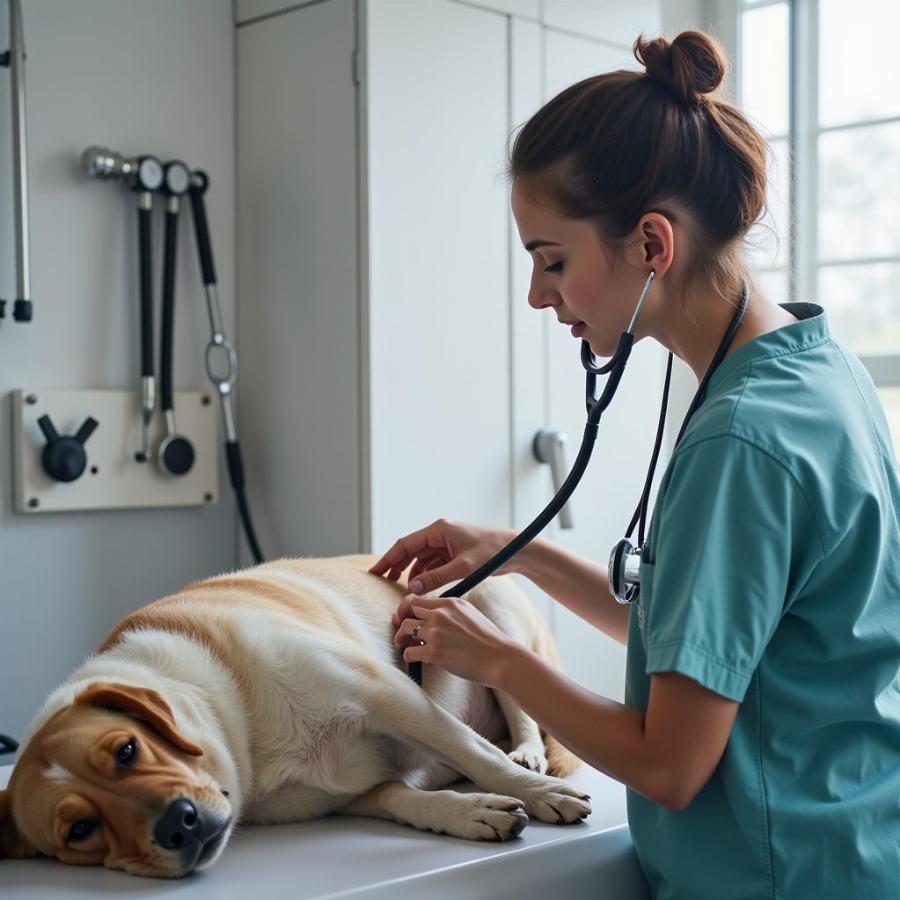Why is your dog munching on mud? It’s a question many dog owners ask themselves, often with a wrinkled nose and a confused look. Dirt-eating, also known as geophagia, is a surprisingly common behavior in dogs and can be triggered by several factors. While a little bit of dirt-snacking might be harmless, it’s essential to understand the underlying causes to ensure your furry friend stays healthy and happy. Let’s dig into the reasons behind this peculiar canine habit and explore when it’s time to call the vet.
Medical Reasons Your Dog Might Be Eating Dirt
Sometimes, the urge to eat dirt stems from a medical issue. One possibility is anemia, a condition characterized by a deficiency of red blood cells or hemoglobin. If your dog is anemic, they might instinctively crave dirt as a way to supplement minerals. Another medical cause could be gastrointestinal problems. Dogs experiencing digestive upset might eat dirt to soothe their stomachs or induce vomiting. Additionally, certain nutritional deficiencies, particularly a lack of essential minerals like iron or calcium, can drive dogs to seek them out in unconventional places, like the backyard.
Behavioral Reasons for Dirt-Eating in Dogs
Beyond medical reasons, behavioral factors can also play a significant role in your dog’s dirt-eating habit. Boredom or stress are common culprits. Just like humans might nervously bite their nails, dogs might turn to dirt-eating as a coping mechanism when feeling anxious or under-stimulated. Puppies, in particular, are known to explore their world through their mouths, and dirt can become a tempting target. Sometimes, it’s simply a matter of pica, an eating disorder characterized by the consumption of non-nutritive substances. This can be influenced by breed predispositions, with some breeds being more prone to pica than others.
When to Worry About Your Dog’s Dirt Consumption
While occasional dirt nibbling might not be cause for alarm, excessive or persistent dirt-eating warrants a visit to the vet. If you notice your dog eating dirt frequently, especially in combination with other symptoms like vomiting, diarrhea, lethargy, or changes in appetite, it’s crucial to seek professional advice. Your vet can perform tests to rule out any underlying medical conditions and recommend appropriate treatment or behavioral modifications.
How to Stop Your Dog From Eating Dirt
Addressing your dog’s dirt-eating habit requires a multi-pronged approach. First, consult your veterinarian to rule out any medical concerns. Once medical issues are addressed, focus on behavioral interventions. Enrich your dog’s environment with plenty of toys, puzzles, and engaging activities to combat boredom. Regular exercise can help alleviate stress and redirect their attention away from dirt. Ensure your dog receives a balanced diet to address any potential nutritional deficiencies. In some cases, training techniques, such as positive reinforcement and redirection, can be effective in curbing the behavior.
Is Eating Dirt Harmful to My Dog?
Is eating dirt actually harmful? The answer depends on several factors. Small amounts of dirt are unlikely to cause significant harm. However, ingesting large quantities of dirt can lead to intestinal blockages, which can be a serious medical emergency. Furthermore, dirt can be contaminated with parasites, bacteria, or toxins, posing a risk of infection or poisoning. Fertilizers, pesticides, and other chemicals used in gardens can be particularly dangerous if ingested.
What if My Dog Eats Potting Soil?
Potting soil, with its added fertilizers, can be especially harmful to dogs. If your dog ingests potting soil, monitor them closely for signs of distress and contact your veterinarian immediately.
Can My Dog Get Sick From Eating Dirt?
Yes, your dog can get sick from eating dirt. Aside from the risks of intestinal blockages and exposure to toxins, dirt can harbor parasites like roundworms and hookworms, which can cause various health problems.
 Dog Eating Dirt: Risks
Dog Eating Dirt: Risks
Conclusion: Understanding Your Dirt-Eating Dog
Understanding why your dog is eating dirt is crucial for their well-being. By addressing the underlying causes, whether medical or behavioral, you can help your furry friend break this habit and live a healthier, happier life. Remember, consulting with your veterinarian is always the best course of action if you’re concerned about your dog’s dirt-eating behavior.
FAQs About Dogs Eating Dirt
-
Is it normal for dogs to eat dirt? While some occasional dirt nibbling can be normal, especially in puppies, frequent or excessive dirt-eating can indicate an underlying problem.
-
What deficiencies cause dogs to eat dirt? Mineral deficiencies, such as iron or calcium deficiency, can sometimes lead to dirt-eating in dogs.
-
How do I stop my dog from eating dirt? Address any underlying medical issues with your vet and implement behavioral modifications like increased exercise, enrichment, and training.
Further Reading
Want to learn more about dog health and behavior? Check out these related articles: what is the best anti itch medicine for dogs, weenie dog clothes. You might also find our article on molly mutt dog crate cover helpful for creating a comfortable and safe space for your dog. If you’re looking for a stylish and functional dog house, check out our reviews on indoor dog house large dog and buy insulated dog house.
Beaut Dogs is your one-stop shop for everything dog-related. We offer expert advice on all aspects of dog ownership, from breed selection to comprehensive care guides. When you need support, contact us at Email: [email protected] to get detailed and accurate answers from Beaut Dogs. Visit https://beautdogs.com today to dive into the wonderful world of dogs and learn how to best care for them!